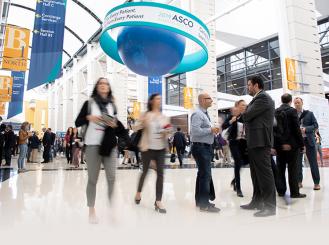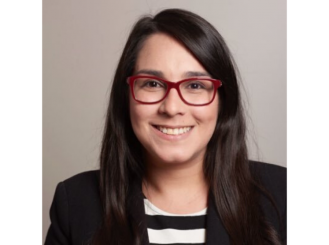Mar 05, 2020
By Ana I. Velázquez Mañana, MD, MSc
As an oncology trainee, attending the ASCO Annual Meeting represents a unique and irreplaceable learning opportunity. However, regardless of our stage of training, the meeting can be overwhelming! We can easily feel lost amid the crowd of enthusiastic oncologists and scientists walking through McCormick Place. I particularly recall this feeling from my first time attending an ASCO Annual Meeting as a medical student in 2013. Among my experiences from that meeting, I remember: the multitude of dark suits going up and down the stairs of McCormick Place, an endless Starbucks line, thousands of posters, and numerous talks spread throughout the venue.
In 2019, I attended my third Annual Meeting, but my first as a hematology-oncology fellow. As I now reflect on my experience, these are my five takeaways.
1. Early organization is key!
Whether you are a first-time attendee or a seasoned trainee, navigating the ASCO Annual Meeting can be a daunting task. Setting clear goals for the meeting is crucial for distributing your time and selecting what activities to attend. As lifelong learners and current trainees, we feel inner pressures to attend every session and learn from every practice-changing abstract. Accepting that this is an impossible task is the first step towards making the most of your meeting experience!
By taking advantage of the ASCO iPlanner app (available the week of May 7, 2020), I carefully selected and prioritized the sessions that were most appealing to me. Syncing the app with my Outlook calendar was extremely helpful in organizing my days. Adding every planned event and your travel time to your schedule will help you carve out time for your morning run or coffee with friends. Attending summary sessions, such as the Highlights of the Day presentations or Cancer Takeaways talks in the Trainee & Early Career Lounge, is a great way to maximize your learning experience. These sessions provide an excellent overview of the most impactful abstracts discussed during the meeting, adding the value of perspectives and analysis of expert discussants.
2. Tailor your experience: there’s room for everyone and every interest!
While oncology continues to evolve as a field, the needs and focus of its diverse workforce also change and evolve. As a trainee with “non-traditional” interests, deciding between disease-specific sessions and those focused on quality, outcomes, or disparities was a challenge. However, I was pleasantly surprised by the variety of sessions I could choose from which highlighted ongoing work on quality, education, disparities, community engagement, and equity. Having the flexibility to tailor the meeting and learning experience to my interests was vital to identify those who share similar interests, enhancing my education and my networking.
3. Be a mentor and a mentee.
One critical aspect of our careers is finding a robust group of mentors, both locally and outside our institution. Within oncology, whether your goals are to be in academia, industry, or community practice, identifying mentors who can provide guidance, advice, and experience in the field is vital. The ASCO Annual Meeting represents a unique way to meet oncologists at different career stages who may share your background or interests. Educational and career development sessions offered in the Trainee & Early Career Lounge and Women’s Networking Lounge are the perfect places to identify more senior physicians with whom you can connect. I found the “30-Minute Mentoring Meetings” a beneficial opportunity which I would recommend to every trainee. During these 30-minute sessions, you can meet with an expert of your choice who has volunteered their time to provide career advice to trainees or early-career oncologists. This experience allowed me to connect one-on-one with national and international oncologists who share my interests in disparities and who have helped me outline my future training steps.
Moreover, the meeting provides the opportunity for us to grow from our roles as mentees to mentors. As a medical student, I had the chance to participate in ASCO’s Medical Student Rotation for Underrepresented Populations. Besides providing mentorship, this program allowed me to meet other minority medical students and residents interested in oncology and discuss their research interests. During the 2019 meeting, through the Annual Meeting Buddy Program, I had the great opportunity to give back and serve as a mentor to a group of medical students from Mexico interested in oncology. As a Latina, supporting and mentoring other minority students has always been one of my career goals. As a training oncologist, this opportunity also allowed me to gain further perspective on the challenges faced by our immigrant patient population and a better understanding of their needs.
4. Exciting conversations happen online—if you don’t have a Twitter account, set one up now!
Within the social media revolution, there’s also room for medicine. Notably, Twitter has transformed from a platform formerly utilized for personal matters to one in which now we connect as a professional community. During scientific meetings such as #ASCO20, social media provides an outstanding way for clinicians and scientists from across the world to connect, share, and learn the latest updates. From experts live-tweeting their perspectives during sessions to vivid community discussions about the most recent trials, Twitter has become an excellent resource for fellow education. Moreover, it is a unique networking resource that allows us to connect (online and in real life) with researchers, clinicians, and patient advocates across the globe. (Find more social media tips for trainees and junior faculty.)
5. Have some fun! Find time to connect with friends and colleagues.
As over 35,000 professionals meet yearly in Chicago to attend the ASCO Annual Meeting, you will undoubtedly share this experience with current and former colleagues, mentors, and friends. One of the biggest highlights of attending the 2019 Annual Meeting was having the opportunity to reconnect with medical school and residency friends whom I cannot see regularly. Whether you are sharing training and work experiences or catching up on new babies and weddings, purposefully finding the time and place to reconnect is vital.
Dr. Velázquez Mañana is a clinical fellow in the Division of Hematology and Oncology at the University of California, San Francisco. Her clinical and research interests include thoracic oncology, cancer disparities, and quality of care delivered to racial minority patients with cancer and survivors. Follow her on Twitter @anavmanana.


